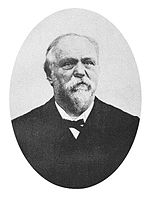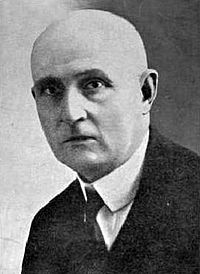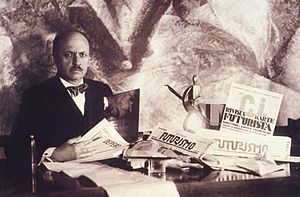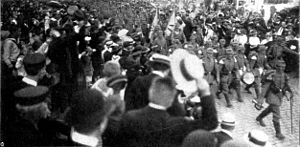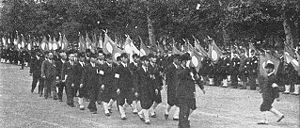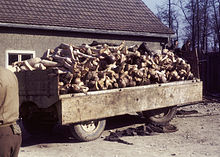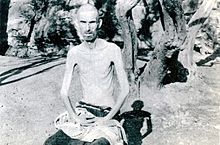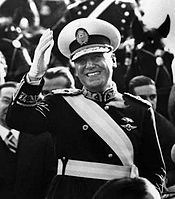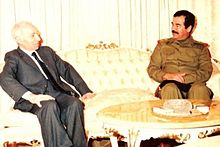
Fascism
About this schools Wikipedia selection
The articles in this Schools selection have been arranged by curriculum topic thanks to SOS Children volunteers. Click here for more information on SOS Children.
Fascism (pron.: / ˈ f æ ʃ ɪ z əm /) is a form of radical authoritarian nationalism that came to prominence in mid-20th century Europe. Fascists seek to unify their nation through a totalitarian state that promotes the mass mobilization of the national community, relying on a vanguard party to initiate a revolution to organize the nation on fascist principles. Hostile to democracy, liberalism, socialism, and communism, fascist movements share certain common features, including the veneration of the state, a devotion to a strong leader, and an emphasis on ultranationalism, ethnocentrism, and militarism. Fascism views political violence, war, and imperialism as a means to achieve national rejuvenation and asserts that "superior" nations and races should attain living space by displacing weak and inferior ones.
Fascist ideology consistently invoked the primacy of the state. Leaders such as Benito Mussolini in Italy and Adolf Hitler in Germany embodied the state and claimed indisputable power. Fascism borrowed theories and terminology from socialism but applied them to what it saw as the more significant conflict between nations and races rather than to class conflict, and focused on ending the divisions between classes within the nation. It advocated a mixed economy, with the principal goal of achieving autarky to secure national self-sufficiency and independence through protectionist and interventionist economic policies. Fascism opposed socialist and communist ideology but was also critical of some aspects of capitalism, arguing for what is sometimes called a Third Position between capitalism and Marxist socialism. Fascist movements emphasized a belligerent, virulent form of nationalism ( chauvinism) and a fear of foreign people ( xenophobia), which they frequently linked to an exaggerated ethnocentrism. The typical fascist state also embraced militarism, a belief in the rigors and virtues of military life as an individual and national ideal, meaning much of public life was organized along military lines and an emphasis put on uniforms, parades, and monumental architecture.
Influenced by national syndicalism, the first fascist movements emerged in Italy around World War I, combining elements of left-wing politics with more typically right-wing positions, in opposition to socialism, communism, liberal democracy and, in some cases, traditional right-wing conservatism. Although fascism is usually placed on the far right on the traditional left-right spectrum, fascists themselves and some commentators have argued that the description is inadequate. Following the Second World War, few parties openly describe themselves as fascist and the term is more usually used pejoratively by political opponents. The term neo-fascist or post-fascist is sometimes applied more formally to describe parties of the far right with ideological similarities to, or roots in, 20th century fascist movements respectively.
Etymology
The term fascismo is derived from the Latin word fasces. The fasces, which consisted of a bundle of rods that were tied around an axe, was an ancient Roman symbol of the authority of the civic magistrate. They were carried by his lictors and could be used for corporal and capital punishment at his command. The word fascismo also relates to political organizations in Italy known as fasci, groups similar to guilds or syndicates.
The symbolism of the fasces suggested strength through unity: a single rod is easily broken, while the bundle is difficult to break. Similar symbols were developed by different fascist movements. For example the Falange symbol is five arrows joined together by a yoke.
Definitions
Historians, political scientists and other scholars have long debated the exact nature of fascism. Each form of fascism is distinct, leaving many definitions too wide or narrow.
Roger Griffin describes fascism as "a genus of political ideology whose mythic core in its various permutations is a palingenetic form of populist ultranationalism". Griffin describes the ideology as having three core components: "(i) the rebirth myth, (ii) populist ultra-nationalism and (iii) the myth of decadence". Fascism is "a genuinely revolutionary, trans-class form of anti-liberal, and in the last analysis, anti-conservative nationalism" built on a complex range of theoretical and cultural influences. He distinguishes an inter-war period in which it manifested itself in elite-led but populist "armed party" politics opposing socialism and liberalism and promising radical politics to rescue the nation from decadence.
Emilio Gentile describes fascism within ten constituent elements:
- "1) a mass movement with multiclass membership in which prevail, among the leaders and the militants, the middle sectors, in large part new to political activity, organized as a party militia, that bases its identity not on social hierarchy or class origin but on a sense of comradeship, believes itself invested with a mission of national regeneration, considers itself in a state of war against political adversaries and aims at conquering a monopoly of political power by using terror, parliamentary politics, and deals with leading groups, to create a new regime that destroys parliamentary democracy;"
- "2) an 'anti-ideological' and pragmatic ideology that proclaims itself antimaterialist, anti-individualist, antiliberal, antidemocratic, anti-Marxist, is populist and anticapitalist in tendency, expresses itself aesthetically more than theoretically by means of a new political style and by myths, rites, and symbols as a lay religion designed to acculturate, socialize, and integrate the faith of the masses with the goal of creating a 'new man';"
- "3) a culture founded on mystical thought and the tragic and activist sense of life conceived of as the manifestation of the will to power, on the myth of youth as artificer of history, and on the exaltation of the militarization of politics as the model of life and collective activity;"
- "4) a totalitarian conception of the primacy of politics, conceived of as an integrating experience to carry out the fusion of the individual and the masses in the organic and mystical unity of the nation as an ethnic and moral community, adopting measures of discrimination and persecution against those considered to be outside this community either as enemies of the regime or members of races considered to be inferior or otherwise dangerous for the integrity of the nation;"
- "5) a civil ethic founded on total dedication to the national community, on discipline, virility, comradeship, and the warrior spirit;"
- "6) a single state party that has the task of providing for the armed defense of the regime, selecting its directing cadres, and organizing the masses within the state in a process of permanent mobilization of emotion and faith;"
- "7) a police apparatus that prevents, controls, and represses dissidence and opposition, even by using organized terror;"
- "8) a political system organized by hierarchy of functions named from the top and crowned by the figure of the 'leader,' invested with a sacred charisma, who commands, directs, and coordinates the activities of the party and the regime;"
- "9) corporative organization of the economy that suppresses trade union liberty, broadens the sphere of state intervention, and seeks to achieve, by principles of technocracy and solidarity, the collaboration of the 'productive sectors' under control of the regime, to achieve its goals of power, yet preserving private property and class divisions;"
- "10) a foreign policy inspired by the myth of national power and greatness, with the goal of imperialist expansion."
Stanley Payne describes fascism within three sectors of characteristics: its ideology and goals, its negations, and its style and organization. They are the following:
- "A. Ideology and Goals:"
- "Espousal of an idealist, vitalist, and voluntaristic philosophy, normally involving the attempt to realize a new modern, self-determined, and secular culture"
- "Creation of a new nationalist authoritarian state not based on traditional principles or models"
- "Organization of a new highly regulated, multiclass, integrated national economic structure, whether called national corporatist, national socialist, or national syndicalist"
- "Positive evaluation and use of, or willingness to use violence and war"
- "The goal of empire, expansion, or a radical change in the nation's relationship with other powers"
- "B. The Fascist Negations:"
- "Antiliberalism"
- "Anticommunism"
- "Anticonservatism (though with the understanding that fascist groups were willing to undertake temporary alliances with other sectors, more commonly with the right)"
- "C. Style and Organization:"
- "Attempted mass mobilization with militarization of political relationships and style and with the goal of a mass single party militia"
- "Emphasis on aesthetic structure of meetings, symbols, and political liturgy, stressing emotional and mystical aspects"
- "Extreme stress on the masculine principle and male dominance, while espousing a strongly organic view of society"
- "Exaltation of youth above other phases of life, emphasizing the conflict of the generations, at least in effecting the initial political transformation"
- "Specific tentency toward an authoritarian, charismatic, personal style of command, whether or not the command is to some degree initially elective"
Paxton sees fascism as "a form of political behaviour marked by obsessive preoccupation with community decline, humiliation, or victimhood and by compensatory cults of unity, energy, and purity, in which a mass-based party of committed nationalist militants, working in uneasy but effective collaboration with traditional elites, abandons democratic liberties and pursues with redemptive violence and without ethical or legal restraints goals of internal cleansing and external expansion."
One common definition of fascism focuses on three groups of ideas:
- The Fascist Negations of anti-liberalism, anti-communism and anti-conservatism.
- Nationalist, authoritarian goals for the creation of a regulated economic structure to transform social relations within a modern, self-determined culture.
- A political aesthetic using romantic symbolism, mass mobilisation, a positive view of violence, promotion of masculinity and youth and charismatic leadership.
Position in the political spectrum
Fascism is commonly described as " extreme right" although some writers have found placing fascism on a conventional left-right political spectrum difficult. Fascism was influenced by both left and right, conservative and anti-conservative, national and supranational, rational and anti-rational. A number of historians have regarded fascism either as a revolutionary centrist doctrine, as a doctrine which mixes philosophies of the left and the right, or as both of those things. Fascism was founded during World War I by Italian national syndicalists who combined left-wing and right-wing political views.
Fascism is considered by certain scholars to be right-wing because of its social conservatism and authoritarian means of opposing egalitarianism. Roderick Stackleberg places fascism—including Nazism, which he says is "a radical variant of fascism"—on the right, explaining that "the more a person deems absolute equality among all people to be a desirable condition, the further left he or she will be on the ideological spectrum. The more a person considers inequality to be unavoidable or even desirable, the further to the right he or she will be."
Italian Fascism gravitated to the right in the early 1920s. A major element of fascism that has been deemed as clearly far-right is its goal to promote the right of claimed superior people to dominate while purging society of claimed inferior elements.
Benito Mussolini in 1919 described fascism as a movement that would strike "against the backwardness of the right and the destructiveness of the left". Later the Italian Fascists described fascism as a right-wing ideology in the political program The Doctrine of Fascism, stating: "We are free to believe that this is the century of authority, a century tending to the 'right,' a fascist century." However Mussolini clarified that fascism's position on the political spectrum was not a serious issue to fascists and stated that:
Fascism, sitting on the right, could also have sat on the mountain of the centre ... These words in any case do not have a fixed and unchanged meaning: they do have a variable subject to location, time and spirit. We don't give a damn about these empty terminologies and we despise those who are terrorized by these words.
The accommodation of the political right into the Italian Fascist movement in the early 1920s led to the creation of internal factions. The "Fascist left" included Michele Bianchi, Giuseppe Bottai, Angelo Oliviero Olivetti, Sergio Panunzio and Edmondo Rossoni, who were committed to advancing national syndicalism as a replacement for parliamentary liberalism in order to modernize the economy and advance the interests of workers and the common people. The "Fascist right" included members of the paramilitary Squadristi and former members of the Italian Nationalist Association (ANI). The Squadristi wanted to establish Fascism as a complete dictatorship, while the former ANI members, including Alfredo Rocco, sought an authoritarian corporatist state to replace the liberal state in Italy, while retaining the existing elites. However upon accommodating the political right, there arose a group of monarchist Fascists who sought to use Fascism to create an absolute monarchy under King Victor Emmanuel III of Italy.
After King Victor Emmanuel III forced Mussolini to resign as head of government and put him under arrest in 1943, Mussolini was rescued by German forces and now dependent on Germany for support, Mussolini and remaining loyal Fascists founded the Italian Social Republic with Mussolini as head of state. Mussolini sought to re-radicalize Italian Fascism, declaring that the Fascist state had been overthrown because Italian Fascism had been subverted by Italian conservatives and the bourgeoisie. Then the new Fascist government proposed the creation of workers' councils and profit-sharing in industry, however German authorities who effectively controlled northern Italy at this point, ignored these measures and did not seek to enforce them.
A number of fascist movements described themselves as a " third position" outside the traditional political spectrum. Spanish Falangist leader José Antonio Primo de Rivera said: "basically the Right stands for the maintenance of an economic structure, albeit an unjust one, while the Left stands for the attempt to subvert that economic structure, even though the subversion thereof would entail the destruction of much that was worthwhile".
Fascist as insult
Following the defeat of the Axis powers in World War II, the term fascist has been used as a pejorative word, often referring to widely varying movements across the political spectrum. George Orwell wrote in 1944 that "the word 'Fascism' is almost entirely meaningless ... almost any English person would accept 'bully' as a synonym for 'Fascist'". Richard Griffiths argued in 2005 that "fascism" is the "most misused, and over-used word, of our times". "Fascist" is sometimes applied to post-war organizations and ways of thinking that academics more commonly term " neo-fascist".
Contrary to the common mainstream academic and popular use of the term, Communist states have sometimes been referred to as "fascist", typically as an insult. Marxist interpretations of the term have, for example, been applied in relation to Cuba under Fidel Castro and Vietnam under Ho Chi Minh. Herbert Matthews, of the New York Times asked "Should we now place Stalinist Russia in the same category as Hitlerite Germany? Should we say that she is Fascist?" J. Edgar Hoover wrote extensively of "Red Fascism". Chinese Marxists used the term to denounce the Soviet Union during the Sino-Soviet Split, and likewise, the Soviets used the term to identify Chinese Marxists.
History
Fin de siècle era and the fusion of Maurrasism with Sorelianism (1880–1914)
The ideological roots of fascism have been traced to the 1880s, and in particular the fin de siècle theme of that time. The theme was based on revolt against materialism, rationalism, positivism, bourgeois society and democracy. The fin-de-siècle generation supported emotionalism, irrationalism, subjectivism and vitalism. The fin-de-siècle mindset saw civilization as being in a crisis that required a massive and total solution. The fin-de-siècle intellectual school considered the individual as only one part of the larger collectivity, which should not be viewed as an atomized numerical sum of individuals. They condemned the rationalistic individualism of liberal society and the dissolution of social links in bourgeois society.
The fin-de-siècle outlook was influenced by various intellectual developments, including Darwinian biology; Wagnerian aesthetics; Arthur de Gobineau's racialism; Gustave Le Bon's psychology; and the philosophies of Friedrich Nietzsche, Fyodor Dostoyevsky and Henri Bergson. Social Darwinism, which gained widespread acceptance, made no distinction between physical and social life, and viewed the human condition as being an unceasing struggle to achieve the survival of the fittest. Social Darwinism challenged positivism's claim of deliberate and rational choice as the determining behaviour of humans, with social Darwinism focusing on heredity, race, and environment. Social Darwinism's emphasis on biogroup identity and the role of organic relations within societies fostered legitimacy and appeal for nationalism. New theories of social and political psychology also rejected the notion of human behaviour being governed by rational choice, and instead claimed that emotion was more influential in political issues than reason. Nietzsche's argument that "God is dead" coincided with his attack on the "herd mentality" of Christianity, democracy and modern collectivism; his concept of the übermensch; and his advocacy of the will to power as a primordial instinct, were major influences upon many of the fin-de-siècle generation. Bergson's claim of the existence of an "élan vital" or vital instinct centred upon free choice and rejected the processes of materialism and determinism, this challenged Marxism.
Gaetano Mosca in his work The Ruling Class (1896) developed the theory that claims that in all societies an "organized minority" will dominate and rule over the "disorganized majority". Mosca claims that there are only two classes in society, "the governing" (the organized minority) and "the governed" (the disorganized majority). He claims that the organized nature of the organized minority makes it irresistible to any individual of the disorganized majority.
The rise of support for anarchism in this period of time was important in influencing the politics of fascism. The anarchist Mikhail Bakunin's concept of propaganda of the deed that stressed the importance of direct action as the primary means of politics - including revolutionary violence, became popular amongst fascists who admired the concept and adopted it as a part of fascism.
French nationalist and reactionary monarchist Charles Maurras influenced fascism. Maurras promoted what he called integral nationalism, that called for organic unity of a nation, Maurras insisted that a powerful monarch was an ideal leader of a nation. Maurras distrusted what he considered the democratic mystification of the popular will that created an impersonal collective subject. He claimed that a powerful monarch was a personified sovereign who could exercise authority to unite a nation's people. Maurras' integral nationalism was idealized by fascists, but modified into a modernized revolutionary form that was devoid of Maurras' monarchism.
One of the key persons who greatly influenced fascism, the French revolutionary syndicalist Georges Sorel was greatly influenced by anarchism and contributed to the fusion of anarchism and syndicalism together into anarcho syndicalism. Sorel promoted the legitimacy of political violence in his work Reflections on Violence (1908) and other works in which he advocated radical syndicalist action to achieve a revolution to overthrow capitalism and the bourgeoisie through a general strike. In Reflections on Violence, Sorel emphasized need for a revolutionary political religion. Also, in his work The Illusions of Progress, Sorel denounced democracy as reactionary, saying "nothing is more aristocratic than democracy". By 1909 after the failure of a syndicalist general strike in France, Sorel and his supporters left the radical left and went to the radical right, where they sought to merge militant Catholicism and French patriotism with their views - advocating anti-republican Christian French patriots as ideal revolutionaries. Initially Sorel had officially been a revisionist of Marxism, but by 1910 announced his abandonment of socialist literature and claimed in 1914, using an aphorism of Benedetto Croce that "socialism is dead" because of the "decomposition of Marxism". Sorel became a supporter of reactionary Maurrassian nationalism beginning in 1909 that influenced his works. Maurras held interest in merging his nationalist ideals with Sorelian syndicalism as a means to confront democracy. Maurras famously stated "a socialism liberated from the democratic and cosmopolitan element fits nationalism well as a well made glove fits a beautiful hand".
The fusion of Maurassian nationalism and Sorelian syndicalism influenced radical Italian nationalist Enrico Corradini. Corradini spoke of the need for a nationalist-syndicalist movement, led by elitist aristocrats and anti-democrats who shared a revolutionary syndicalist commitment to direct action and a willingness to fight. Corradini spoke of Italy as being a "proletarian nation" that needed to pursue imperialism in order to challenge the " plutocratic" French and British. Corradini's views were part of a wider set of perceptions within the right-wing Italian Nationalist Association (ANI), which claimed that Italy's economic backwardness was caused by corruption in its political class, liberalism, and division caused by "ignoble socialism". The ANI held ties and influence among conservatives, Catholics, and the business community. Italian national syndicalists held a common set of principles: the rejection of bourgeois values, democracy, liberalism, Marxism, internationalism, and pacifism, and the promotion of heroism, vitalism, and violence. The ANI claimed that liberal democracy was no longer compatible with the modern world, and advocated a strong state and imperialism, claiming that humans are naturally predatory and that nations were in a constant struggle, in which only the strongest could survive.
Futurism that was both an artistic-cultural movement and initially a political movement in Italy led by Filippo Tommaso Marinetti who founded the Futurist Manifesto (1908), that championed the causes of modernism, action, and political violence as necessary elements of politics while denouncing liberalism and parliamentary politics. Marinetti rejected conventional democracy for based on majority rule and egalitarianism while promoting a new form of democracy, that he described in his work "The Futurist Conception of Democracy" as the following: "We are therefore able to give the directions to create and to dismantle to numbers, to quantity, to the mass, for with us number, quantity and mass will never be—as they are in Germany and Russia—the number, quantity and mass of mediocre men, incapable and indecisive".
Futurism influenced fascism in its emphasis on recognizing the virile nature of violent action and war as being necessities of modern civilization. Marinetti promoted the need of physical training of young men, saying that in male education, gymnastics should take precedence over books, and he advocated segregation of the genders on this matter, in that womanly sensibility must not enter men's education whom Marinetti claimed must be "lively, bellicose, muscular and violently dynamic".
World War I and aftermath (1914–1929)

At the outbreak of World War I in August 1914, the Italian political left became severely split over its position on the war. The Italian Socialist Party (PSI) opposed the war on the grounds of internationalism, but a number of Italian revolutionary syndicalists supported intervention against Germany and Austria-Hungary on the grounds that their reactionary regimes needed to be defeated to ensure the success of socialism. Corradini presented the same need for Italy as a "proletarian nation" to defeat a reactionary Germany from a nationalist perspective. The origins of Italian Fascism resulted from this split, first with Angelo Oliviero Olivetti forming an pro-interventionist fasci called the Fasci of International Action in October 1914. Benito Mussolini upon being expelled from his position as chief editor of the PSI's newspaper Avanti! for his pro-Entente stance, joined the interventionist cause in a separate fasci. The term "Fascism" was first used in 1915 by members of Mussolini's movement, the Fasci of Revolutionary Action.
Mussolini accused conventional socialists for being dogmatic and in December 1914 criticized the PSI for their association with Marxism that Mussolini declared had become obsolete. Mussolini made a list of socialist figures ranging from the top of admirable socialist figures at the top like Mazzini, Pierre-Joseph Proudhon, Mikhail Bakunin, Charles Fourier, and Henri de Saint-Simon; while placing unadmirable socialists at the bottom, including Karl Marx. The first meeting of the Fasci of Revolutionary Action was held on 24 January 1915. At the meeting Mussolini declared that it was necessary for Europe to resolve its national problems - including national borders - of Italy and elsewhere "for the ideals of justice and liberty for which oppressed peoples must acquire the right to belong to those national communities from which they descended". Amidst discussion on the question of irredentism, Mussolini noted from the proceedings of the members that "the difficult question of irredentism was posed and resolved in the ambit of ideals of socialism and liberty which do not however exclude the safeguarding of a positive national interest". Its attempts to hold mass meetings were ineffective and it was regularly harassed by government authorities and socialists. Antagonism between interventionists, including Fascists, and anti-interventionist socialists resulted in violence.
Similar political ideas arose in Germany after the outbreak of the war. German sociologist Johann Plenge spoke of the rise of a "National Socialism" in Germany within what he termed the "ideas of 1914" that were a declaration of war against the "ideas of 1789" (the French Revolution). According to Plenge, the "ideas of 1789" that included rights of man, democracy, individualism and liberalism were being rejected in favour of "the ideas of 1914" that included "German values" of duty, discipline, law, and order. Plenge believed that ethnic solidarity ( volksgemeinschaft) would replace class division and that "racial comrades" would unite to create a socialist society in the struggle of "proletarian" Germany against "capitalist" Britain. He believed that the " Spirit of 1914" manifested itself in the concept of the "People's League of National Socialism". This National Socialism was a form of state socialism that rejected the "idea of boundless freedom" and promoted an economy that would serve the whole of Germany under the leadership of the state. This National Socialism was opposed to capitalism because of the components that were against "the national interest" of Germany, but insisted that National Socialism would strive for greater efficiency in the economy. Plenge advocated an authoritarian rational ruling elite to develop National Socialism through a hierarchical technocratic state.
Fascists viewed World War I as bringing revolutionary changes in the nature of war, society, the state, and technology, as the advent of total war and mass mobilization had broken down the distinction between civilian and combatant, as civilians had become a critical part in economic production for the war effort, and thus arose a "military citizenship" in which all citizens were involved to the military in some manner during the war. World War I had resulted in the rise of a powerful state capable of mobilizing millions of people to serve on the frontlines or provide economic production and logistics to support those on the front lines, as well as having precedented authority to intervene in the lives of citizens. Fascists viewed technological developments of weaponry and the state's total mobilization of its population in the war as symbolizing the beginning a new era fusing state power with mass politics, technology, and particularly the mobilizing myth that they contended had triumphed over the myth of progress and the era of liberalism.

A major event that greatly influenced the development of fascism was the October Revolution of 1917 in which Bolshevik communists led by Vladimir Lenin seized power in Russia. In 1917, Mussolini as leader of the Fasci of Revolutionary Action praised the October Revolution, however Mussolini later became unimpressed with Lenin, regarding him as merely a new version of Tsar Nicholas. After World War I fascists have commonly campaigned on anti-Marxist agendas. However both Bolshevism and fascism hold ideological similarities: both advocate a revolutionary ideology, both believe in the necessity of a vanguard elite, both have disdain for bourgeois values, and both had totalitarian ambitions. In practice, fascism and Bolshevism have commonly emphasized revolutionary action, proletarian nation theories, single-party states, and party-armies.
With the antagonism between anti-interventionist Marxists and pro-interventionist Fascists complete by the end of the war, the two sides became irreconcilable. The Fascists presented themselves as anti-Marxists and as opposed to the Marxists. Benito Mussolini consolidated control over the Fascist movement in 1919 with the founding of the Fasci italiani di combattimento, whose opposition to socialism he declared:
We declare war against socialism, not because it is socialism, but because it has opposed nationalism. Although we can discuss the question of what socialism is, what is its program, and what are its tactics, one thing is obvious: the official Italian Socialist Party has been reactionary and absolutely conservative. If its views had prevailed, our survival in the world of today would be impossible.
In 1919, Alceste De Ambris and Futurist movement leader Filippo Tommaso Marinetti created The Manifesto of the Italian Fasci of Combat (a.k.a. the Fascist Manifesto). The Manifesto was presented on June 6, 1919 in the Fascist newspaper Il Popolo d'Italia. The Manifesto supported the creation of universal suffrage for both men and women (the latter being realized only partly in late 1925, with all opposition parties banned or disbanded); proportional representation on a regional basis; government representation through a corporatist system of "National Councils" of experts, selected from professionals and tradespeople, elected to represent and hold legislative power over their respective areas, including labour, industry, transportation, public health, communications, etc.; and the abolition of the Italian Senate. The Manifesto supported the creation of an eight-hour work day for all workers, a minimum wage, worker representation in industrial management, equal confidence in labour unions as in industrial executives and public servants, reorganization of the transportation sector, revision of the draft law on invalidity insurance, reduction of the retirement age from 65 to 55, a strong progressive tax on capital, confiscation of the property of religious institutions and abolishment of bishoprics, and revision of military contracts to allow the government to seize 85% of their profits. It also called for the creation of a short-service national militia to serve defensive duties, nationalization of the armaments industry, and a foreign policy designed to be peaceful but also competitive.
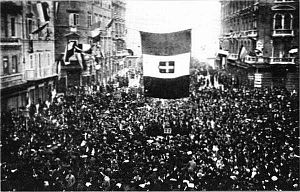
The next events that influenced the Fascists in Italy was the raid of Fiume by Italian nationalist Gabriele d'Annunzio and the founding of the Charter of Carnaro in 1920. D'Annunzio and De Ambris designed the Charter, which advocated national-syndicalist corporatist productionism alongside D'Annunzio's political views. Many Fascists saw the Charter of Carnaro as an ideal constitution for a Fascist Italy. This behaviour of aggression towards Yugoslavia and South Slavs was pursued by Italian Fascists with their persecution of South Slavs - especially Slovenes and Croats.
With the 1920, militant strike activity by industrial workers reached its peak in Italy, where 1919 and 1920 were known as the "Red Years". Mussolini and the Fascists took advantage of the situation by allying with industrial businesses and attacking workers and peasants in the name of preserving order and internal peace in Italy.
Fascists identified their primary opponents as the majority of socialists on the left who had opposed intervention in World War I. The Fascists and the Italian political right held common ground: both held Marxism in contempt, discounted class consciousness and believed in the rule of elites. The Fascists assisted the anti-socialist campaign by allying with the other parties and the conservative right in a mutual effort to destroy the Italian Socialist Party and labour organizations committed to class identity above national identity.
Fascism sought to accommodate Italian conservatives by making major alterations to its political agenda;– abandoning its previous populism, republicanism, and anticlericalism, adopting policies in support of free enterprise, and accepting the Roman Catholic Church and the monarchy as institutions in Italy. To appeal to Italian conservatives, Fascism adopted policies such as promoting family values, including promotion policies designed to reduce the number of women in the workforce limiting the woman's role to that of a mother. The fascists banned literature on birth control and increased penalties for abortion in 1926, declaring both crimes against the state. Though Fascism adopted a number of positions designed to appeal to reactionaries, the Fascists sought to maintain Fascism's revolutionary character, with Angelo Oliviero Olivetti saying "Fascism would like to be conservative, but it will [be] by being revolutionary." The Fascists supported revolutionary action and committed to secure law and order to appeal to both conservatives and syndicalists.
Prior to Fascism's accommodation of the political right, Fascism was a small, urban, northern Italian movement that had about a thousand members. After Fascism's accommodation of the political right, the Fascist movement's membership soared to approximately 250,000 by 1921.
Beginning in 1922, Fascist paramilitaries escalated their strategy from one of attacking socialist offices and homes of socialist leadership figures to one of violent occupation of cities. The Fascists met little serious resistance from authorities and proceeded to take over several northern Italian cities. The Fascists attacked the headquarters of socialist and Catholic unions in Cremona and imposed forced Italianization upon the German-speaking population of Trent and Bolzano. After seizing these cities, the Fascists made plans to take Rome.

On 24 October 1922, the Fascist party held its annual congress in Naples, where Mussolini ordered Blackshirts to take control of public buildings and trains and to converge on three points around Rome. The Fascists managed to seize control of several post offices and trains in northern Italy while the Italian government, led by a left-wing coalition, was internally divided and unable to respond to the Fascist advances. King Victor Emmanuel III of Italy perceived the risk of bloodshed in Rome in response to attempting to disperse the Fascists to be too high. Victor Emmanuel III decided to appoint Mussolini as Prime Minister of Italy, and Mussolini arrived in Rome on 30 October to accept the appointment. Fascist propaganda aggrandized this event, known as " March on Rome", as a "seizure" of power because of Fascists' heroic exploits.
Upon being appointed Prime Minister of Italy, Mussolini had to form a coalition government, because the Fascists did not have control over the Italian parliament. Mussolini's coalition government initially pursued economically liberal policies under the direction of liberal finance minister Alberto De Stefani, including balancing the budget through deep cuts to the civil service. Initially, little drastic change in government policy had occurred and repressive police actions were limited.
The Fascists began their attempt to entrench Fascism in Italy with the Acerbo Law, which guaranteed a plurality of the seats in parliament to any party or coalition list in an election that received 25% or more of the vote. Through considerable Fascist violence and intimidation, the list won a majority of the vote, allowing many seats to go to the Fascists. In the aftermath of the election, a crisis and political scandal erupted after Socialist Party deputy Giacomo Matteoti was kidnapped and murdered by a Fascist. The liberals and the leftist minority in parliament walked out in protest in what became known as the Aventine Secession. On 3 January 1925, Mussolini addressed the Fascist-dominated Italian parliament and declared that he was personally responsible for what happened, but he insisted that he had done nothing wrong. He proclaimed himself dictator of Italy, assuming full responsibility over the government and announcing the dismissal of parliament. From 1925 to 1929, Fascism steadily became entrenched in power: opposition deputies were denied access to parliament, censorship was introduced, and a December 1925 decree made Mussolini solely responsible to the King.
In 1929, the Fascist regime gained the political support and blessing of the Roman Catholic Church after the regime signed a concordat with the Church, known as the Lateran Treaty, which gave the papacy state sovereignty and financial compensation for the seizure of Church lands by the liberal state in the nineteenth century.
The Fascist regime created a corporatist economic system in 1925 with creation of the Palazzo Vidioni Pact, in which the Italian employers' association Confindustria and Fascist trade unions agreed to recognize each other as the sole representatives of Italy's employers and employees, excluding non-Fascist trade unions. The Fascist regime first created a Ministry of Corporations that organized the Italian economy into 22 sectoral corporations, banned workers' strikes and lock-outs, and in 1927 created the Charter of Labour, which established workers' rights and duties and created labour tribunals to arbitrate employer-employee disputes. In practice, the sectoral corporations exercised little independence and were largely controlled by the regime, and employee organizations were rarely led by employees themselves but instead by appointed Fascist party members.
In the 1920s, Fascist Italy pursued an aggressive foreign policy that included an attack on the Greek island of Corfu, aims to expand Italian territory in the Balkans, plans to wage war against Turkey and Yugoslavia, attempts to bring Yugoslavia into civil war by supporting Croat and Macedonian separatists to legitimize Italian intervention, and making Albania a de facto protectorate of Italy, which was achieved through diplomatic means by 1927. In response to revolt in the Italian colony of Libya, Fascist Italy abandoned previous liberal-era colonial policy of cooperation with local leaders. Instead, claiming that Italians were a superior race to African races and thereby had the right to colonize the "inferior" Africans, it sought to settle 10 to 15 million Italians in Libya. This resulted in an aggressive military campaign known as the Pacification of Libya against natives in Libya, including mass killings, the use of concentration camps, and the forced starvation of thousands of people. Italian authorities committed ethnic cleansing by forcibly expelling 100,000 Bedouin Cyrenaicans, half the population of Cyrenaica in Libya, from their settlements that was slated to be given to Italian settlers.
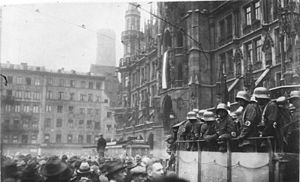
The March on Rome brought Fascism international attention. One early admirer of the Italian Fascists was Adolf Hitler, who, less than a month after the March, had begun to model himself and the Nazi Party upon Mussolini and the Fascists. The Nazis, led by Hitler and the German war hero Erich Ludendorff, attempted a "March on Berlin" modeled upon the March on Rome, which resulted in the failed Beer Hall Putsch in Munich in November 1923.
International surge of fascism and World War II (1929–45)
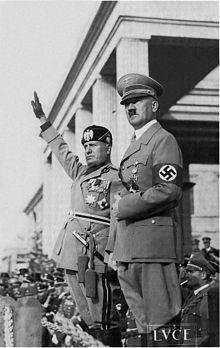
The events of the Great Depression resulted in an international surge of fascism and the creation of several fascist regimes and regimes that adopted fascist policies. The most important new fascist regime was Nazi Germany, under the leadership of Adolf Hitler. With the rise of Hitler and the Nazis to power in 1933, liberal democracy was dissolved in Germany, and the Nazis mobilized the country for war, with expansionist territorial aims against several countries. In the 1930s the Nazis implemented racial laws that deliberately discriminated against, disenfranchised, and persecuted Jews and other racial and minority groups.
Fascist movements grew in strength elsewhere in Europe. Hungarian fascist Gyula Gömbös rose to power as Prime Minister of Hungary in 1932 and attempted to entrench his Party of National Unity throughout the country; created an eight-hour work day, a forty-eight hour work week in industry, and sought to entrench a corporatist economy; and pursued irredentist claims on Hungary's neighbors. The fascist Iron Guard movement in Romania soared in political support after 1933, gaining representation in the Romanian government, and an Iron Guard member assassinated Romanian prime minister Ion Duca. During the 6 February 1934 crisis, France faced the greatest domestic political turmoil since the Dreyfus Affair when the fascist Francist Movement and multiple far right movements rioted en masse in Paris against the French government resulting in major political violence. A variety of para-fascist governments that borrowed elements from fascism were formed during the Great Depression, including those of Greece, Lithuania, Poland, and Yugoslavia.
In the Americas, the Brazilian Integralists led by Plínio Salgado, claimed as many as 200,000 members although following coup attempts it faced a crackdown from the Estado Novo of Getúlio Vargas in 1937. In the 1930s, the National Socialist Movement of Chile gained seats in Chile's parliament and attempted a coup d'état that resulted in the Seguro Obrero massacre of 1938.
During the Great Depression, Mussolini promoted active state intervention in the economy. He denounced the contemporary " supercapitalism" that he claimed began in 1914 as a failure because of its alleged decadence, support for unlimited consumerism and intention to create the "standardization of humankind". Fascist Italy created the Institute for Industrial Reconstruction (IRI), a giant state-owned firm and holding company that provided state funding to failing private enterprises. The IRI was made a permanent institution in Fascist Italy in 1937, pursued Fascist policies to create national autarky, and had the power to take over private firms to maximize war production. In the late 1930s, Italy enacted manufacturing cartels, tariff barriers, currency restrictions, and massive regulation of the economy to attempt to balance payments. However, Italy's policy of autarky failed to achieve effective economic autonomy. Nazi Germany similarly pursued an economic agenda with the aims of autarky and rearmament and imposed protectionist policies, including forcing the German steel industry to use lower-quality German iron ore rather than superior-quality imported iron.
In Fascist Italy and Nazi Germany both pursued territorial expansionist and interventionist foreign policy agendas from the 1930s through the 1940s culminating in World War II. Mussolini called for irredentist Italian claims to be reclaimed, establishing Italian domination of the Mediterranean Sea and securing Italian access to the Atlantic Ocean, and the creation of Italian spazio vitale ("vital space") in the Mediterranean and Red Sea regions. Hitler called for irredentist German claims to be reclaimed along with the creation of German lebensraum ("living space") in Eastern Europe, including territories held by the Soviet Union, that would be colonized by Germans.
From 1935 to 1939 Germany and Italy escalated their demands for territorial claims and greater influence in world affairs. Italy invaded Ethiopia in 1935 resulting in condemnation by the League of Nations and widespread diplomatic isolation. In 1936 Germany remilitarized the industrial Rhineland; the region had been ordered demilitarized by the Treaty of Versailles. In 1938 Germany annexed Austria and Italy assisted in Germany in resolving the diplomatic crisis between Germany versus Britain and France over claims on Czechoslovakia by arranging the Munich Agreement that gave Germany the Sudetenland and was perceived at the time to have averted a European war, these hopes faded when Hitler violated the Munich Agreement by ordering the invasion and partition of Czechoslovakia between Germany and a client state of Slovakia in 1939. At the same time from 1938 to 1939, Italy was demanding territorial and colonial concessions from France and Britain. In 1939, Germany prepared for war with Poland, but attempted to gain territorial concessions from Poland through diplomatic means. The Polish government did not trust Hitler's promises and refused to accept Germany's demands.
The invasion of Poland by Germany was deemed unacceptable by Britain, France and their allies, resulting in their mutual declaration of war against Germany that was deemed the aggressor in the war in Poland, resulting in the outbreak of World War II. In 1940, Mussolini led Italy into World War II on the side of the Axis. Mussolini was aware that Italy did not have the military capacity to carry out a long war with France or the United Kingdom and waited until France was on the verge of imminent collapse and surrender from German invasion before declaring war on France and the United Kingdom on 10 June 1940, on the assumption that the war would be short-lived following France's collapse. Mussolini believed that following a brief entry of Italy into war with France, followed by the imminent French surrender, Italy could gain some territorial concessions from France and then concentrate its forces on a major offensive in Egypt where British and Commonwealth forces were outnumbered by Italian forces. Plans by Germany to invade the UK in 1940 failed after Germany lost the aerial warfare campaign in the Battle of Britain. The war became prolonged contrary to Mussolini's plans resulting in Italy losing battles on multiple fronts and requiring German assistance. In 1941 the Axis campaign spread to the Soviet Union after Hitler launched Operation Barbarossa. Axis forces at the height of their power controlled almost all of continental Europe.
During World War II, the Axis Powers in Europe, led by Nazi Germany participated in the extermination of millions of Poles, Jews, Gypsies and others in the genocide known as the Holocaust. In Asia, Japan committed large massacres of Chinese civilians.
After 1942, Axis forces began to falter. By 1943, after Italy faced multiple military failures, complete reliance and subordination of Italy to Germany, and Allied invasion of Italy, and corresponding international humiliation, Mussolini was removed as head of government and arrested by the order of King Victor Emmanuel III who proceeded to dismantle the Fascist state and declared Italy's switching of allegiance to the Allied side. Mussolini was rescued from arrest by German forces and led the German client state, the Italian Social Republic from 1943 to 1945. Nazi Germany faced multiple losses and steady Soviet and Western Allied offensives from 1943 to 1945.
On 28 April 1945, Mussolini was captured and executed by Italian communist partisans. On 30 April 1945, Hitler committed suicide. Shortly afterwards Germany surrendered and the Nazi regime was dismantled and key Nazi members arrested to stand trial for crimes against humanity involving the Holocaust.
Post-World-War II (1945–present)
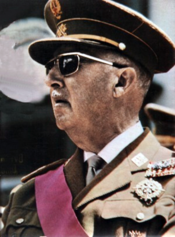
In the aftermath of World War II, the victory of the Allies over the Axis powers led to the collapse of multiple fascist regimes in Europe. The Nuremberg Trials convicted multiple Nazi leaders of crimes against humanity involving the Holocaust.
However there remained multiple ideologies and governments that were ideologically related to fascism.
Francisco Franco's Falangist single-party state in Spain was officially neutral in World War II and survived the collapse of the Axis Powers. Franco's rise to power had been directly assisted by the militaries of Fascist Italy and Nazi Germany during the Spanish Civil War, and had sent volunteers to fight on the side of Nazi Germany against the Soviet Union during World War II. After World War II and a period of international isolation, Franco's regime normalized relations with Western powers in the Cold War, until Franco's death in 1975 and the transformation of Spain into a liberal democracy.
Peronism associated with the regime of Juan Peron in Argentina from 1946 to 1955 and 1973 to 1974, was strongly influenced by fascism. Prior to rising to power, from 1939 to 1941, Peron had developed a deep admiration of Italian Fascism and modelled his economic policies on Italian Fascist economic policies.
Another ideology strongly influenced by fascism is Ba'athism. Ba'athism is a revolutionary Arab nationalist ideology that seeks the unification of all claimed Arab lands into a single Arab state. Zaki al-Arsuzi, one of the principal founders of Ba'athism was strongly influenced by and supportive of fascism and Nazism. Several close associates of Ba'athism's key ideologist Michel Aflaq have admitted that Aflaq had been directly inspired by certain fascist and Nazi theorists. Ba'athist regimes in power in Iraq and Syria have held strong similarities to fascism, they are radical authoritarian nationalist single-party states. Because of Ba'athism's anti-Western stances it preferred the Soviet Union in the Cold War and admired and adopted certain Soviet organizational structures for their governments, however the Iraqi Ba'athist regimes persecuted communists while the Syrian Ba'athist regime collaborated with them. Like fascist regimes, Ba'athism became heavily militarized in power. Ba'athist movements governed Iraq in 1963 and again from 1968 to 2003 and in Syria from 1963 to present. Ba'athist heads of state such as Syrian President Hafez al-Assad and Iraqi President Saddam Hussein created personality cults around themselves portraying themselves as the nationalist saviours of the Arab world.
Ba'athist Iraq under Saddam Hussein pursued ethnic cleansing or liquidation of minorities, pursued expansionist wars against Iran and Kuwait, and gradually replaced pan-Arabism with an Iraqi nationalism that emphasized Iraq's connection to the glories of ancient Mesopotamian empires, including Babylonia. Ba'athist Iraq openly promoted anti-Persian and antisemitic racism, such as Ba'athist Iraq's endorsement of Khairallah Talfah's Three Whom God Should Not Have Created: Persians, Jews, and Flies (1940) during the Iran-Iraq War, including other works alleging of Jewish-Persian conspiracy against Iraq dating back to ancient times when Nebuchadnezzar II persecuted the Jews in Babylonia while the Persia allowed the Babylonian Jews to seek refuge in their lands. Historian of fascism Stanley Payne has said about Saddam Hussein's regime: "There will probably never again be a reproduction of the Third Reich, but Saddam Hussein has come closer than any other dictator since 1945".
Tenets
Nationalism
Nationalism is the main foundation of fascism. The fascist view of a nation is of a single organic entity which binds people together by their ancestry and is a natural unifying force of people. Fascism seeks to solve economic, political, and social problems by achieving a millenarian national rebirth, exalting the nation or race above all else, and promoting cults of unity, strength and purity. European fascist movements all typically espouse a racist conception of non-Europeans being inferior to Europeans. However beyond this, fascists in Europe have not held a unified set of racial views.
Historically most fascists promoted imperialism, however there were several fascist movements that were uninterested in the pursuit of new imperial ambitions.
Totalitarianism
Fascism promotes the establishment of a totalitarian state. The Doctrine of Fascism states, "The Fascist conception of the State is all-embracing; outside of it no human or spiritual values can exist, much less have value. Thus understood, Fascism is totalitarian, and the Fascist State—a synthesis and a unit inclusive of all values—interprets, develops, and potentiates the whole life of a people." In The Legal Basis of the Total State, Nazi political theorist Carl Schmitt described the Nazi intention to form a "strong state which guarantees a totality of political unity transcending all diversity" in order to avoid a "disastrous pluralism tearing the German people apart".
Fascist states pursued policies of social indoctrination through propaganda in education and the media and regulation of the production of educational and media materials. Education was designed to glorify the fascist movement and inform students of its historical and political importance to the nation. It attempted to purge ideas that were not consistent with the beliefs of the fascist movement and to teach students to be obedient to the state.
Third Position economics
Fascism promotes such economics as a " third position" alternative to capitalism and Marxism, as fascism declares both as being obsolete. Such an economic system, is variously termed by fascists as "national corporatism", "national socialism" or "national syndicalism".
Benito Mussolini spoke of this as a "Third Alternative" in 1940 upon Italy's entry into World War II, saying:
This conflict must not be allowed to cancel out all our achievements of the past eighteen years, nor, more importantly, extinguish the hope of a Third Alternative held out by Fascism to mankind fettered between the pillar of capitalist slavery and the post of Marxist chaos.—Benito Mussolini, 1940.
Fascism officially advocates resolution to domestic class conflict within a nation to secure national solidarity. While fascism opposes domestic class conflict, fascism believes that bourgeois-proletarian conflict primarily exists in national conflict between proletarian nations versus bourgeois nations.
Fascism denounces capitalism not because of its competitive nature nor its support of private property that fascism supports; but due to its materialism, individualism, alleged bourgeois decadence, and alleged indifference to the nation. Fascism denounces Marxism for its advocacy of materialist internationalist class identity that fascism regards as an attack upon the emotional and spiritual bonds of nationality and thwarting the achievement of genuine national solidarity.
Benito Mussolini promised a "social revolution" that would "remake" the Italian people. According to Patricia Knight, this was only achieved in part. The people who primarily benefited from Italian fascist social policies were members of the middle and lower-middle classes, who filled jobs in the vastly expanded government workforce, which grew from about 500,000 to 1,000,000 jobs in 1930 alone. Health and welfare spending grew dramatically under Italian fascism, with welfare rising from 7% of the budget in 1930 to 20% in 1940.
The Opera Nazionale Dopolavoro (OND) or "National After-work Program" was one major social welfare initiative in Fascist Italy. Created in 1925, it was the state's largest recreational organisation for adults. The Dopolavoro was responsible for establishing and maintaining 11,000 sports grounds, over 6,400 libraries, 800 movie houses, 1,200 theatres, and over 2,000 orchestras. Membership of the Dopolavoro was voluntary, but it had high participation because of its nonpolitical nature. It is estimated that, by 1936, the OND had organised 80% of salaried workers and, by 1939, 40% of the industrial workforce. The sports activities proved popular with large numbers of workers. The OND had the largest membership of any of the mass Fascist organisations in Italy.
The enormous success of the Dopolavoro in Fascist Italy was the key factor in Nazi Germany's creation of its own version of the Dopolavoro, the Kraft durch Freude (KdF) or "Strength through Joy" program of the Nazi government's German Labour Front, which became even more successful than the Dopolavoro. KdF provided government-subsidized holidays for German workers. KdF was also responsible for the creation of the original Volkswagen ("People's Car"), a state-manufactured automobile that was meant to be cheap enough to allow all German citizens to be able to own one.
While fascists promoted social welfare to ameliorate economic conditions affecting their nation or race as whole, they did not support social welfare for egalitarian reasons. Fascists criticised egalitarianism as preserving the weak. They instead promoted social Darwinist views. Adolf Hitler was opposed to egalitarian and universal social welfare because, in his view, it encouraged the preservation of the degenerate and feeble. While in power, the Nazis created social welfare programs to deal with the large numbers of unemployed. However, those programs were neither egalitarian nor universal, excluding many minority groups and other people whom they felt posed a threat to the future health of the German people.
Action
Fascism emphasizes direct action, including supporting the legitimacy of political violence, as a core part of its politics. Fascism views violent action as a necessity in politics that fascism identifies as being an "endless struggle".
The basis of fascism's support of violent action in politics is connected to social Darwinism. Fascist movements have commonly held social Darwinist views of nations, races, and societies. They argue that nations and races must purge themselves of socially and biologically weak or degenerate people, while simultaneously promoting the creation of strong people, in order to survive in a world defined by perpetual national and racial conflict.
Age and gender roles
Fascism emphasizes youth both in a physical sense of age and in a spiritual sense as related to virility and commitment to action. The Italian Fascists' political anthem was called Giovenezza ("The Youth"). Fascism identifies the physical age period of youth as a critical time for the moral development of people that will affect society.
Italian Fascism pursued what it called "moral hygiene" of youth, particularly regarding sexuality. Fascist Italy promoted what it considered normal sexual behaviour in youth while denouncing what it considered deviant sexual behaviour. It condemned pornography, most forms of birth control and contraceptive devices (with the exception of the condom), homosexuality, and prostitution as deviant sexual behaviour, although enforcement of laws opposed to such practices was erratic and authorities often turned a blind eye. Fascist Italy regarded the promotion of male sexual excitation before puberty as the cause of criminality amongst male youth. Fascist Italy declared homosexuality to be a social disease. Fascist Italy pursued an aggressive campaign to reduce prostitution of young women.
Mussolini perceived women's primary role to be childbearers, while men were warriors, once saying, "war is to man what maternity is to the woman". In an effort to increase birthrates, the Italian Fascist government gave financial incentives to women who raised large families, and initiated policies designed to reduce the number of women employed. Italian Fascism called for women to be honoured as "reproducers of the nation", and the Italian Fascist government held ritual ceremonies to honour women's role within the Italian nation. In 1934, Mussolini declared that employment of women was a "major aspect of the thorny problem of unemployment" and that for women, working was "incompatible with childbearing". Mussolini went on to say that the solution to unemployment for men was the "exodus of women from the work force".
The German Nazi government strongly encouraged women to stay at home to bear children and keep house. This policy was reinforced by bestowing the Cross of Honour of the German Mother on women bearing four or more babies. The unemployment rate was cut substantially, mostly through arms production and sending women home so that men could take their jobs. Nazi propaganda sometimes promoted premarital and extramarital sexual relations, unwed motherhood and divorce, but at other times the Nazis opposed such behaviour. The growth of Nazi power, however, was accompanied by a breakdown of traditional sexual morals with regard to extramarital sex and licentiousness.
The Nazis decriminalized abortion in cases where fetuses had hereditary defects or were of a race the government disapproved of, while the abortion of healthy "pure" German, " Aryan" fetuses remained strictly forbidden. For non-Aryans, abortion was often compulsory. Their eugenics program also stemmed from the "progressive biomedical model" of Weimar Germany. In 1935 Nazi Germany expanded the legality of abortion by amending its eugenics law, to promote abortion for women with hereditary disorders. The law allowed abortion if a woman gave her permission and the fetus was not yet viable, and for purposes of so-called racial hygiene.
The Nazis argued that homosexuality was degenerate, effeminate, perverted, and undermined masculinity because it did not produce children. They considered homosexuality curable through therapy, citing modern scientism and the study of sexology, which said that homosexuality could be felt by "normal" people and not just an abnormal minority. Open homosexuals were among those interned in Nazi concentration camps.
Palingenesis and modernism
Fascism emphasizes both palingenesis and modernism. In particular, fascism's nationalism has been identified as having a palingenetic character. Fascism promotes the regeneration of the nation and purging it of decadence. Fascism accepts forms of modernism that it deems promotes national regeneration while rejecting forms of modernism that are regarded as antithetical to national regeneration. Fascism aestheticized modern technology and its association with speed, power, and violence. Fascism admired advances in the economy in the early 20th century, particularly Fordism and scientific management. Fascist modernism has been recognized to be inspired or developed by various figures such as Filippo Tommaso Marinetti, Ernst Jünger, Gottfried Benn, Louis-Ferdinand Céline, Knut Hamsun, Ezra Pound, and Wyndham Lewis.
In Italy, such modernist influence was exemplified by Marinetti who advocated a palingenetic modernist society that condemned liberal-bourgeois values of tradition and psychology, while promoting a technological-martial religion of national renewal that emphasized militant nationalism. In Germany, it was exemplified by Jünger who was influenced by his observation of the technological warfare during World War I, and claimed that a new social class had been created that he described as the "warrior-worker". Jünger like Marinetti emphasized the revolutionary capacities of technology, and emphasized an "organic construction" between human and machine as a liberating and regenerative force in that challenged liberal democracy, conceptions of individual autonomy, bourgeois nihilism, and decadence. He conceived of a society based on a totalitarian concept of "total mobilization" of such disciplined warrior-workers.
Criticism of fascism
Fascism has been widely criticized and condemned in popular culture since the defeat of the Axis Powers in World War II.
Fascism as a form of tyranny
One of the most common and strongest criticisms of fascism is that it is a tyranny in practice.
Fascism is commonly regarded as deliberately and entirely non-democratic and anti-democratic. Scholar on democracy, Anthony Arblaster has recorded fascists' policy claim about the ideology supporting a form of democracy, but Arblaster regards the claim as a deliberate lie and empty rhetoric, claiming that fascism never intended to put such claims of democracy into practice, and thus he categorizes fascism as non-democratic and anti-democratic in practice.
However, some scholars have rebuked this common critical view. Walter Laqueur says that fascists "would not necessarily accept the label of 'anti-democratic'. In fact many of them argued that they were fighting for a purer and more genuine democracy in which the participation of the individual in politics would not be mediated by professional politicians, clerical influences, the availability of the mass media, but through personal, almost full time involvement in a political movement and through identification with the leader who would represent the feelings and sentiments of the whole people."
Scholar on fascism, Dylan J. Riley has investigated the possibility of fascism being an authoritarian democracy, a term used by Italian Fascist theorist and policymaker Giovanni Gentile to describe fascism. Gentile explicitly rejected the conventional form of democracy, parliamentary democracy for being based on majority rule and thus an inherent assumption of the equality of citizens, while fascism rejects the concept of universal egalitarianism. But Gentile claimed that fascism supported what he called authoritarian democracy. Riley in analysis accepts that fascism can be identified as an authoritarian democracy, and claims that in particular the fascist and quasi-fascist regimes in Italy, Spain, and Romania, replaced multi-party based democracy with corporatist representation of state-sanctioned corporate groups. It was claimed that this system would unite people into interest groups to address the state that would act in the interest of the general will of the nation and thus exercise an orderly form of popular rule. Riley notes that fascists argued that this authoritarian democracy is capable of representing the different interests of society that advise the state and the state acts in the interest of the nation. Riley also notes that in contrast, fascists denounced liberal democracy for not being a true democracy but in fact being un-democratic because from the fascist perspective, elections and parliaments are unable to represent the interests of the nation because it lumps together individuals who have little in common into geographical districts to vote for an array of parties to represent them that results in little unanimity in terms of interests, projects, or intentions, and that liberal democracy's multi-party elections merely serve as a means to legitimize elite rule without addressing the interests of the general will of the nation.
Unprincipled opportunism
A common criticism of the original version of fascism, Italian Fascism, has been the accusation that much of the ideology was merely a by-product of unprincipled opportunism by Mussolini, whom they claimed changed his political stances merely to bolster his personal ambitions while he disguised them as being purposeful to the public. The American ambassador to Italy Richard Washburn Child who became a personal friend and admirer of Mussolini and worked with Mussolini to translate and write an English language autobiography; directly addressed the issue of opportunism in Mussolini's behaviour in the preface of the English language autobiography of Mussolini. Child said "Opportunist is a term of reproach used to brand men who fit themselves to conditions for the reasons of self-interest. Mussolini, as I have learned to know him, is an opportunist in the sense that he believed that mankind itself must be fitted to changing conditions rather than to fixed theories, no matter how many hopes and prayers have been expended on theories and programmes.". Child quoted Mussolini as saying, "The sanctity of an ism is not in the ism; it has no sanctity beyond its power to do, to work, to succeed in practice. It may have succeeded yesterday and fail to-morrow. Failed yesterday and succeed to-morrow. The machine first of all must run!".
Mussolini's actions at the time of the outbreak of World War I were then, and have since, been commonly criticized for being completely opportunist for allegedly suddenly abandoning Marxist egalitarian internationalism he had formerly held in favour of non-egalitarian nationalism. Furthermore such criticisms have noted that upon Mussolini endorsing Italy's intervention in the war against Germany and Austria-Hungary, that he and the new Fascist movement received financial support from foreign sources. Such as receiving funds from Ansaldo (an armaments firm) and other companies. Mussolini was supported by the British Security Service MI5, and was being paid a £100 weekly wage from MI5; this help was authorised by Sir Samuel Hoare. However such criticism has been challenged even by Mussolini's socialist critics at the time who noted that regardless of the financial support he accepted for his pro-interventionist stance, that Mussolini was free to write whatever he wished in his newspaper Il Popolo d'Italia, without prior sanctioning by his financial backers. Furthermore, the major source that Mussolini and the Fascist movement received in World War I was not from capitalists who sought to use Mussolini's new movement, but rather it came from France and is widely believed to have come from French socialists who supported the French government's war against Germany and were sending support to Italian socialists who wanted Italian intervention on France's side.
Furthermore Mussolini's transformation away from Marxism into eventually what became fascism, began prior to World War I, as Mussolini had grown increasingly pessimistic of Marxism and egalitarianism while at the same time he had become increasingly supportive of figures who opposed egalitarianism, such as Nietzsche. By 1902 Mussolini was studying Sorel, Nietzsche, and the sociologist Vilfredo Pareto. Sorel's emphasis on the need for overthrowing decadent liberal democracy and capitalism by the use of violence, direct action, the general strike, and the use of neo-Machiavellian appeals to emotion, impressed Mussolini deeply. His use of Nietzsche made him a highly unorthodox socialist, due to Nietzsche's promotion of elitism and anti-egalitarian views. Prior to World War I, Mussolini's writings over time indicated that he had abandoned Marxism and egalitarianism that he had previously supported, in favour of Nietzsche's übermensch concept and anti-egalitarianism. In 1908, Mussolini wrote a short essay called "Philosophy of Strength" based on his Nietzschean influence, in which Mussolini openly spoke fondly of the ramifications of an impending war in Europe in challenging both religion and nihilism, saying:
a new kind of free spirit will come, strengthened by the war, ... a spirit equipped with a kind of sublime perversity, ... a new free spirit will triumph over God and over Nothing.—Benito Mussolini, "Philosophy of Strength", 1908.
Ideological dishonesty
Fascism has been criticized for being ideologically dishonest.
Major examples of ideological dishonesty have been identified in Italian Fascism's changing relationship with German Nazism. Fascist Italy's official foreign policy positions were known to commonly utilize rhetorical ideological hyperbole to justify its actions, although during Dino Grandi's tenure as Italy's foreign minister, the country engaged in realpolitik free of such fascist hyperbole. Italian Fascism's stance towards German Nazism fluctuated from support from the late 1920s to 1934 involving praising Hitler's rise to power and meeting with Hitler in 1934; to opposition from 1934 to 1936 after the assassination of Italy's ally leader in Austria, Engelbert Dollfuss by Nazis in Austria; and again back to support after 1936 when Germany was the only significant power that did not denounce Italy's invasion and occupation of Ethiopia.
Upon antagonism exploding between Nazi Germany and Fascist Italy over the assassination of Austrian Chancellor Dollfuss in 1934, Mussolini and Italian Fascists denounced and ridiculed Nazism's racial theories, particularly by denouncing its Nordicism, while promoting Mediterraneanism. Mussolini himself responded to Nordicists' claims of Italy being divided into Nordic and Mediterranean racial areas due to Germanic invasions of Northern Italy, by claiming that while Germanic tribes such as the Lombards took control of Italy after the fall of ancient Rome, that they arrived in small numbers of about 8,000 and quickly assimilated into Roman culture and spoke the Latin language within fifty years. Italian Fascism was influenced by the tradition of Italian nationalists scornfully looking down upon Nordicists' claims, and taking pride in comparing the age and sophistication of ancient Roman civilization as well as the classical revival in the Renaissance, to that of Nordic societies that Italian nationalists described as "newcomers" to civilization in comparison. At the height of antagonism between the Nazis and Italian Fascists over race, Mussolini claimed that the Germans themselves were not a pure race and noted with irony that Nazi theory on German superiority was based on the theory of non-German foreigners, such as Frenchman Arthur de Gobineau. However after German-Italian relations reduced in tension in the late 1930s, Italian Fascism sought to harmonize its ideology with German Nazism and combined Nordicist and Mediterranean racial theories, noting that Italians were members of the Aryan Race of a mixed Nordic-Mediterranean subtype.
Mussolini declared in 1938 that Italian Fascism had always been antisemitic, upon Italy adopting antisemitic laws in 1938. When in fact Italian Fascism did not endorse antisemitism until the late 1930s when Mussolini feared alienating antisemitic Nazi Germany whose power and influence was growing in Europe, prior to then there had been major Jewish Italians who had been major Italian Fascist officials prior to this, including Margherita Sarfatti, who had also been Mussolini's mistress. Also, contrary to Mussolini's claim in 1938, only a small number of Italian Fascists were staunchly antisemitic such as Roberto Farinacci and Giuseppe Preziosi while other members, such as Italo Balbo who came from Ferrara that had one of Italy's largest Jewish communities, were disgusted with the antisemitic laws and opposed them. However fascism scholar Mark Neocleous notes that while Italian Fascism did not have a clear commitment to antisemitism, that there were occasional antisemitic statements issued prior to 1938, such as Mussolini in 1919 declaring that the Jewish bankers in London and New York were connected by race to the Russian Bolsheviks, and claimed that eight percent of the Russian Bolsheviks were Jews.


